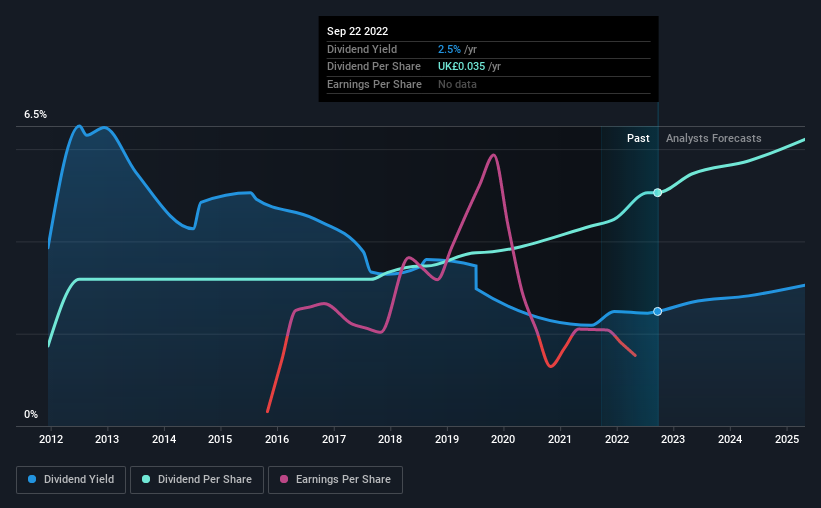- United Kingdom
- /
- Professional Services
- /
- AIM:BEG
Begbies Traynor Group (LON:BEG) Is Paying Out A Larger Dividend Than Last Year
Begbies Traynor Group plc (LON:BEG) will increase its dividend from last year's comparable payment on the 3rd of November to £0.024. Based on this payment, the dividend yield for the company will be 2.5%, which is fairly typical for the industry.
Check out our latest analysis for Begbies Traynor Group
Begbies Traynor Group Is Paying Out More Than It Is Earning
We aren't too impressed by dividend yields unless they can be sustained over time. While Begbies Traynor Group is not profitable, it is paying out less than 75% of its free cash flow, which means that there is plenty left over for reinvestment into the business. We generally think that cash flow is more important than accounting measures of profit, so we are fairly comfortable with the dividend at this level.
Over the next year, EPS is forecast to grow rapidly. If recent patterns in the dividend continues, we would start to get a bit worried, with the payout ratio possibly reaching 443%.

Begbies Traynor Group Has A Solid Track Record
The company has been paying a dividend for a long time, and it has been quite stable which gives us confidence in the future dividend potential. The dividend has gone from an annual total of £0.012 in 2012 to the most recent total annual payment of £0.035. This implies that the company grew its distributions at a yearly rate of about 11% over that duration. So, dividends have been growing pretty quickly, and even more impressively, they haven't experienced any notable falls during this period.
Dividend Growth Potential Is Shaky
Some investors will be chomping at the bit to buy some of the company's stock based on its dividend history. Unfortunately things aren't as good as they seem. Earnings per share has been sinking by 25% over the last five years. Dividend payments are likely to come under some pressure unless EPS can pull out of the nosedive it is in. Over the next year, however, earnings are actually predicted to rise, but we would still be cautious until a track record of earnings growth can be built.
Our Thoughts On Begbies Traynor Group's Dividend
In summary, while it's always good to see the dividend being raised, we don't think Begbies Traynor Group's payments are rock solid. The company is generating plenty of cash, but we still think the dividend is a bit high for comfort. We would probably look elsewhere for an income investment.
It's important to note that companies having a consistent dividend policy will generate greater investor confidence than those having an erratic one. However, there are other things to consider for investors when analysing stock performance. Taking the debate a bit further, we've identified 1 warning sign for Begbies Traynor Group that investors need to be conscious of moving forward. If you are a dividend investor, you might also want to look at our curated list of high yield dividend stocks.
Valuation is complex, but we're here to simplify it.
Discover if Begbies Traynor Group might be undervalued or overvalued with our detailed analysis, featuring fair value estimates, potential risks, dividends, insider trades, and its financial condition.
Access Free AnalysisHave feedback on this article? Concerned about the content? Get in touch with us directly. Alternatively, email editorial-team (at) simplywallst.com.
This article by Simply Wall St is general in nature. We provide commentary based on historical data and analyst forecasts only using an unbiased methodology and our articles are not intended to be financial advice. It does not constitute a recommendation to buy or sell any stock, and does not take account of your objectives, or your financial situation. We aim to bring you long-term focused analysis driven by fundamental data. Note that our analysis may not factor in the latest price-sensitive company announcements or qualitative material. Simply Wall St has no position in any stocks mentioned.
About AIM:BEG
Begbies Traynor Group
Provides business recovery, financial advisory, and property services consultancy services in the United Kingdom.
Flawless balance sheet, good value and pays a dividend.
Market Insights
Community Narratives



